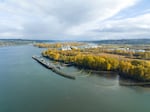Two Oregon environmental and land conservation groups are once again challenging a land-use permit for a Texas-based company proposing to build one of the largest renewable diesel refineries in the country.
Nonprofits Columbia Riverkeeper and 1000 Friends of Oregon, along with a local farmer, filed an appeal with the Oregon Land Use Board of Appeals, or LUBA, on July 16. The groups are looking to reverse a county-approved permit allowing NXTClean Fuels, also known as NEXT Renewable Fuels, to build a quarter-mile rail line from the proposed facility to a main rail track.
“You couldn’t pick a worse spot for a project like this,” said Audrey Leonard, an attorney at Columbia Riverkeeper.

An undated aerial view of Port Westward on the lower Columbia River. Environmental and land conservation groups say NXTClean Fuels' facility would jeopardize local farms.
Paloma Ayala / Courtesy of Columbia Riverkeeper
NEXT is proposing to build a $3 billion facility near Clatskanie at the Port Westward Industrial Park on the lower Columbia River to crank out up to 50,000 barrels a day of sustainable aviation fuel and renewable diesel made out of fish grease, used cooking oil and other agricultural waste.
NEXT officials say the project would fall in line with Oregon’s climate goals to reduce greenhouse gas emissions, and would also generate $45 million per year in local and state tax revenue once in operation.
But Mike Seely, a third-generation mint and spearmint farmer whose property is adjacent to the proposed fuel producer, said he, and some of his peers disagree with the benefits the company is promising.
Seely said the proposed rail line would cut right through an access road that leads to several of his fields. He said the project would also disrupt a system of dikes and levees that control water drainage for much of the farmland in the Columbia River Estuary.
“We’re really concerned about air quality,” Seely said. “We’re concerned about water quality and the ability to convey water out of the drainage district; i.e. during the winter to pump the water out and then during the summer to get irrigation water to where it’s needed throughout the district.”
Groups say the project is not appropriate for the area
This isn’t the first time these groups have sought to slow down the project. In 2022, Columbia Riverkeeper and 1000 Friends of Oregon successfully challenged similar land use permits approved by Columbia County Commissioners. LUBA found the type of rail infrastructure NEXT wanted to build for transporting and storing refined fuel wasn’t allowed on a portion of the land zoned for agricultural use. The board’s decision invalidated the permit.
That’s because the company’s design of five parallel rail tracks fell under the state’s definition of a rail yard, which is not an allowable use on land zoned for agriculture, said Michael Hinrichs, a spokesperson for NEXT Fuels.
So the company went back to the drawing board, reduced the number of lines and shifted some of the tracks so that they fell on industrial-zoned land the company is leasing from the Port of Columbia County. County commissioners unanimously approved the modified plans in March, and the county issued a final order of approval in June.
“There was significantly more local support expressed during public hearings than there was any opposition,” Hinrichs said. “I think that lends itself to locals being behind the project and seeing this design as acceptable from the county land use perspective.”
But Leonard said the same legal problem exists — the rail line conflicts with zoning rules that protect farmland.
“You’ve got a grid of exclusive farm use and zoned industrial land in that area. So what they did is they moved some of the project off of the exclusive farmland and now they’re trying to say that that little piece of it fits within the smaller [land use] exception,” Leonard said.
Hinrichs said he’s not surprised this new round of permits was appealed, but he feels confident LUBA will uphold the county’s decision, and while the company is still waiting on some other state and federal permits, the appeal won’t delay its target date to begin construction in 2025.
“We’ve anticipated [this] since the beginning of us filing our first round of land use permits,” Hinrichs said. “We’re still moving through our federal permit process, and that’ll take a while longer.”
Columbia Riverkeeper’s Leonard said it’s the nonprofit’s intention to permanently stop the project. She, along with other groups, plans to file an opening brief with the board of appeals in August.

